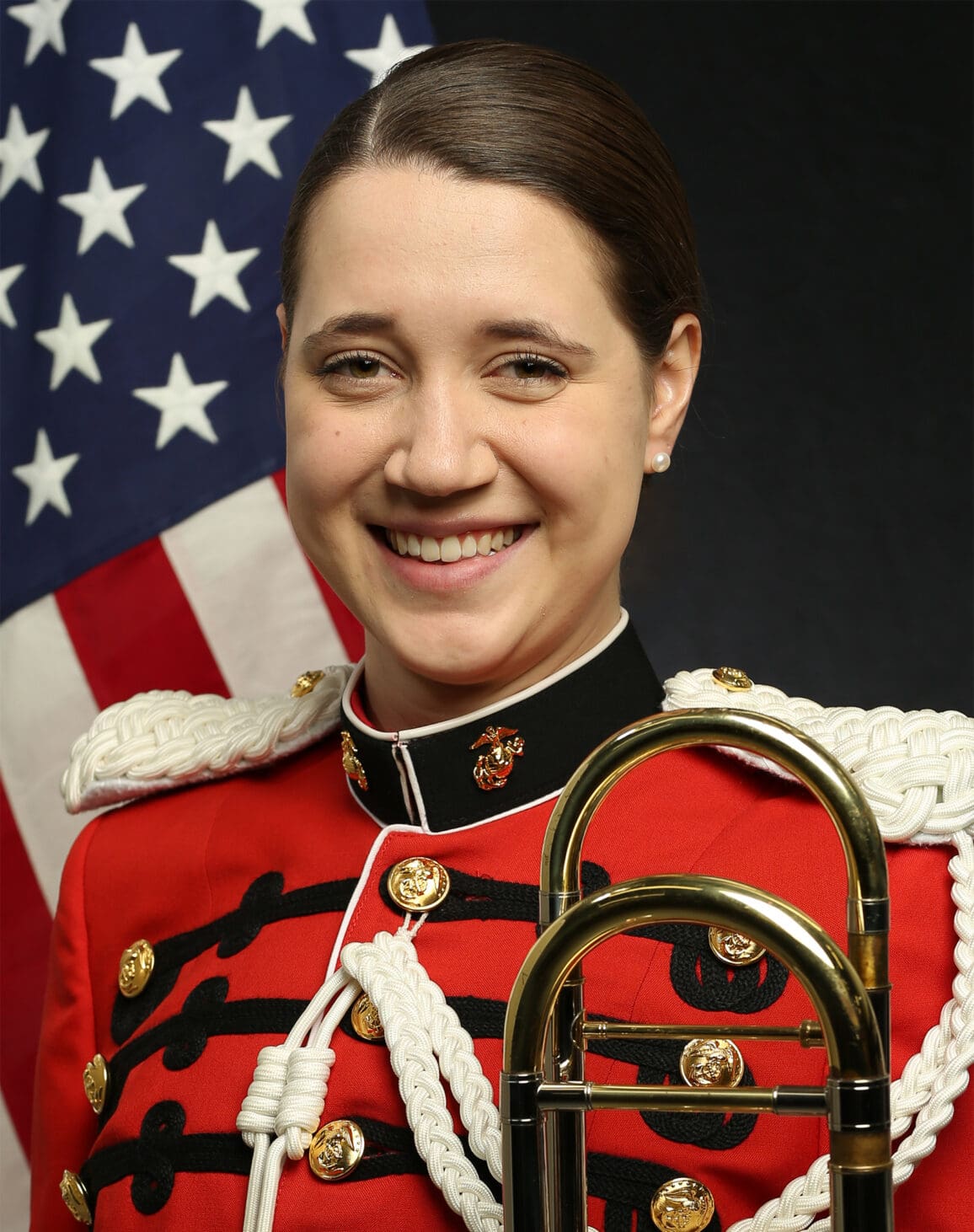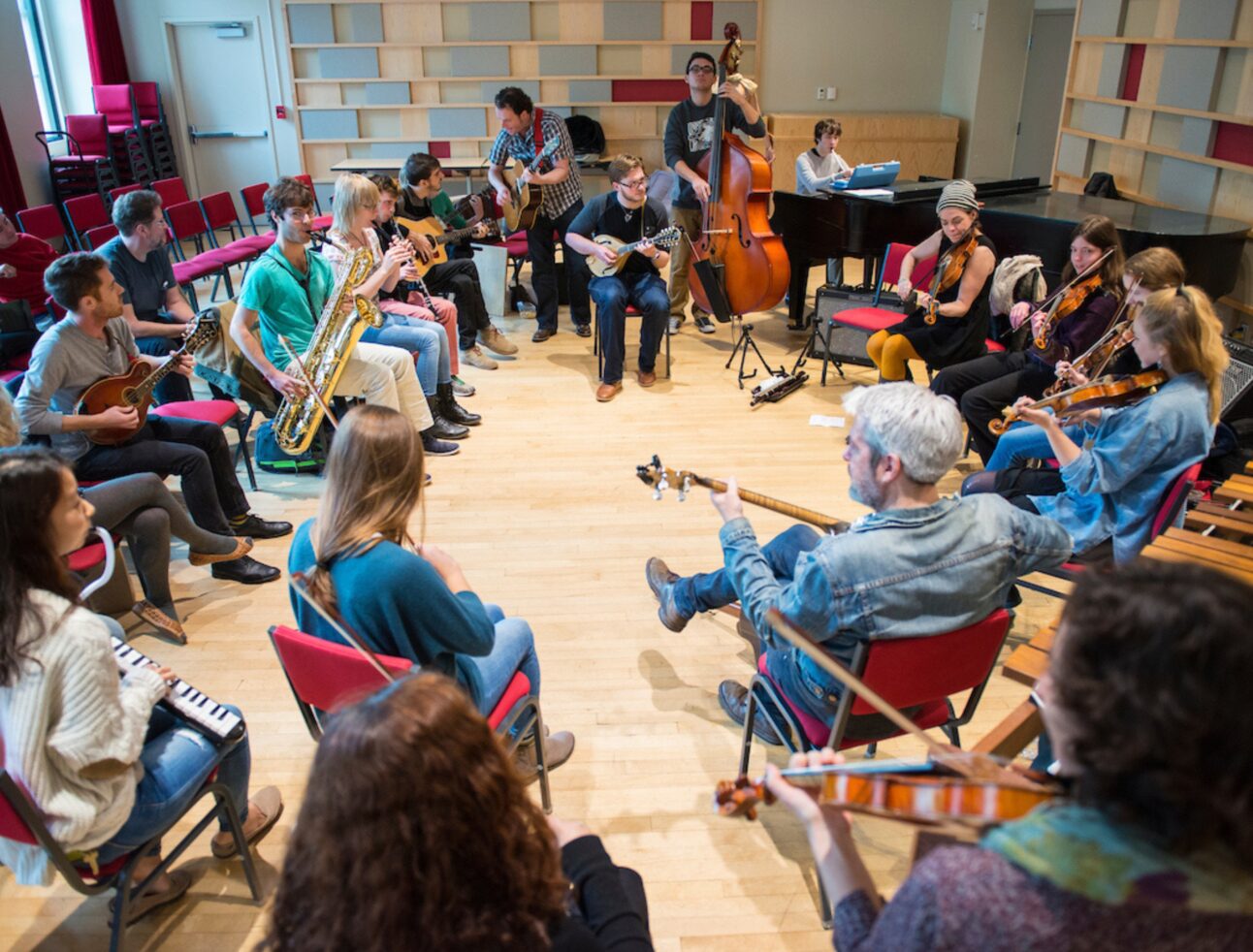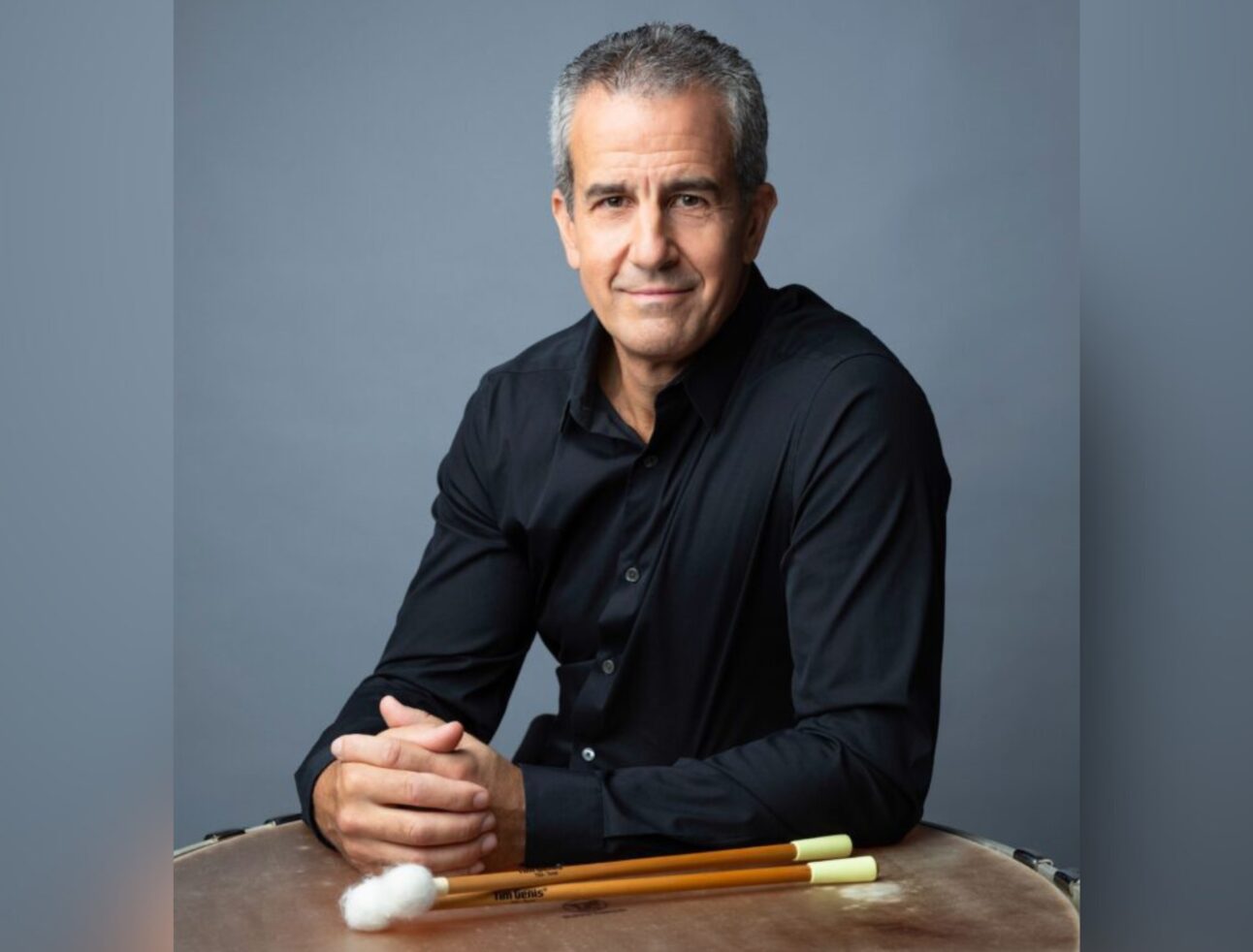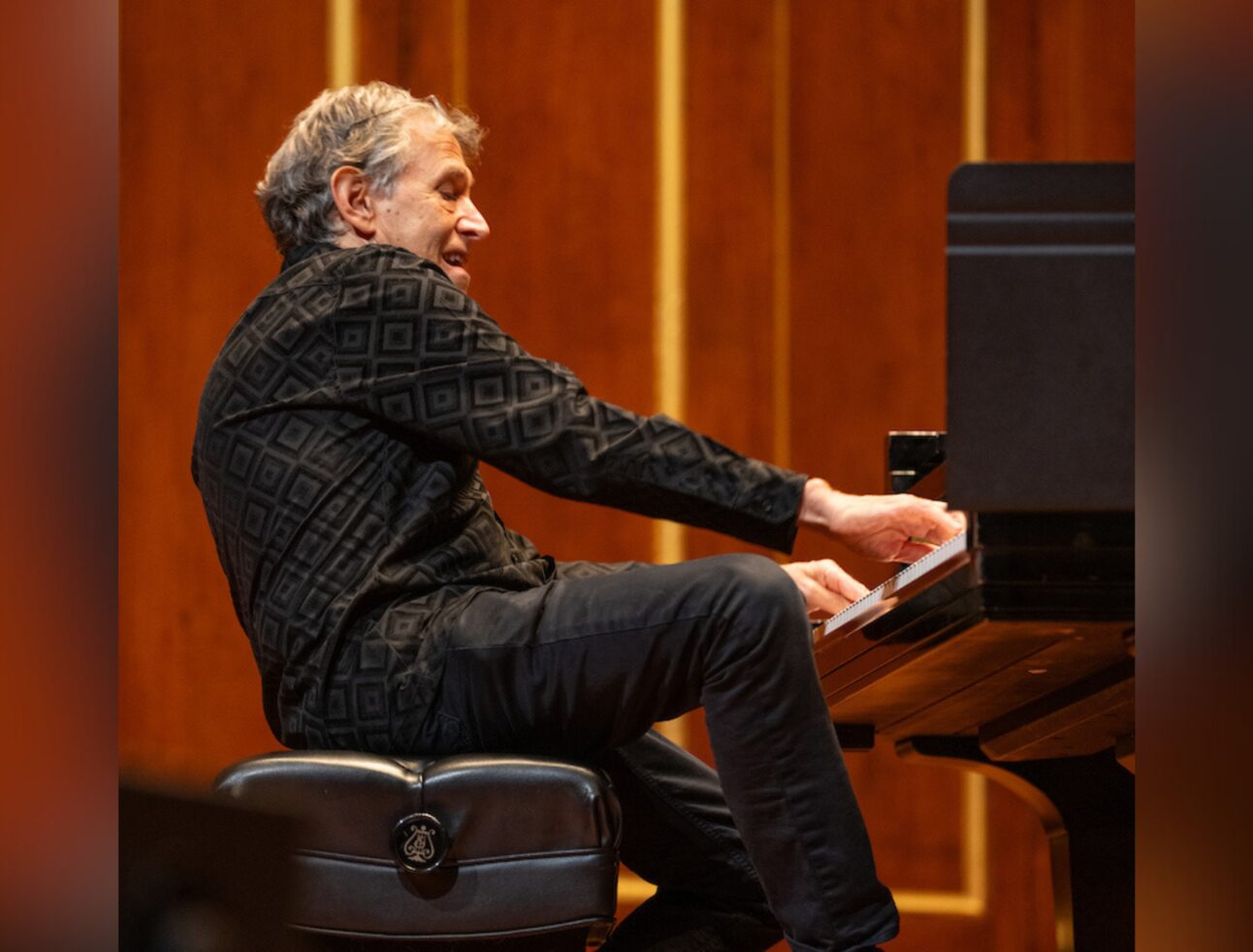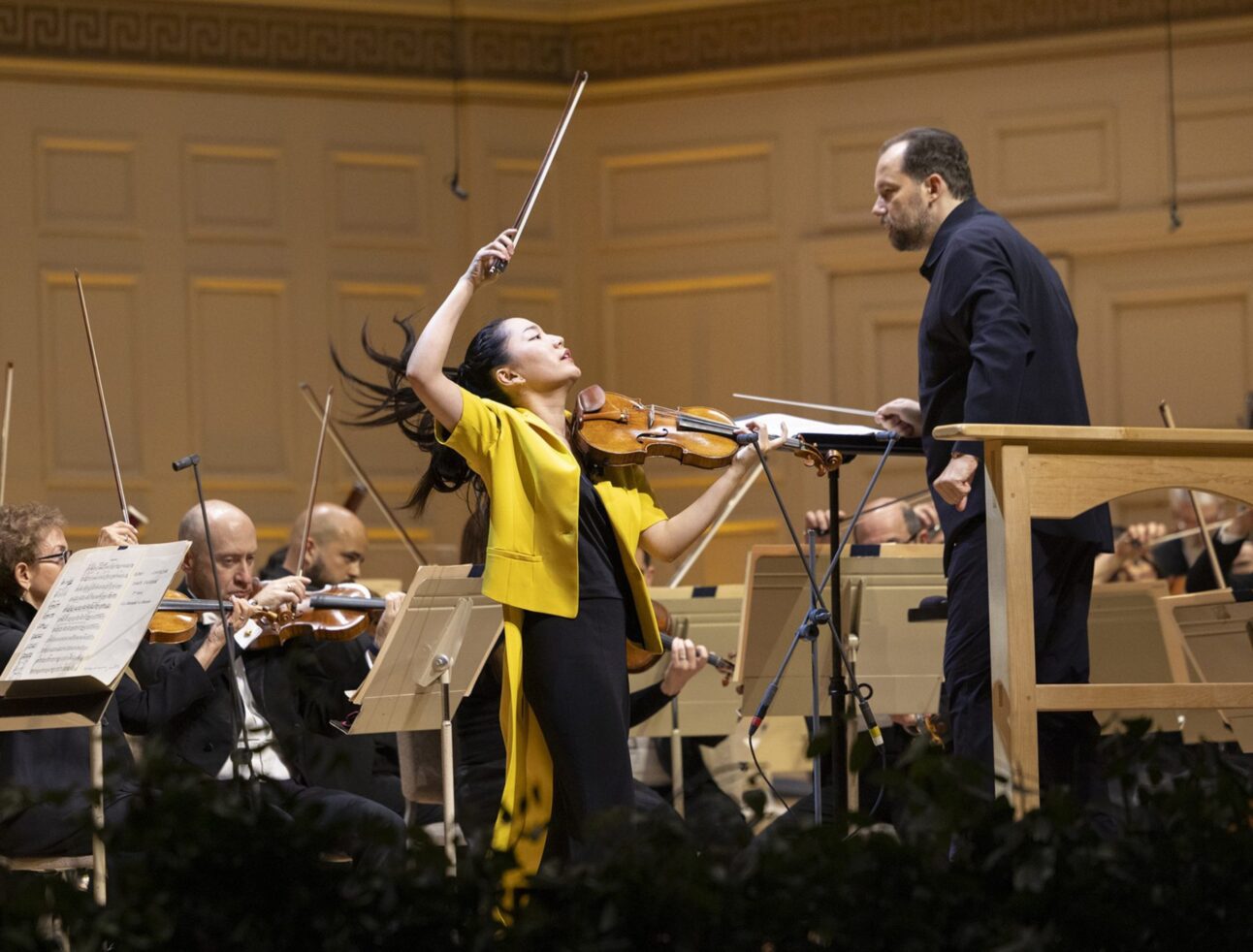In October 2023, NEC alumna and tenor trombonist Katie Franke ’22 MM commenced her role as the first-ever female trombonist and low brass player in the history of the “President’s Own” United States Marine Band. Based in Washington, D.C., she performs with the U.S. Marine Band at the White House, the surrounding D.C. area, and across the country during its annual concert tour. Before her appointment, she substituted with the Houston Symphony, River Oaks Chamber Orchestra, and the New Mexico Philharmonic. Franke earned her Master of Music in Trombone Performance from NEC in 2022, studying under faculty member Steve Lange.
As a female-identifying musician in the male-dominated world of trombone performance, Franke has already made history with her appointment to the U.S. Marine Band and continues to break down barriers for fellow female trombonists. As part of NEC’s Women’s History Month spotlights, Franke shared what she gained from her time at NEC, what life in the U.S. Marine Band looks like, her best advice for female trombonists hoping to pursue music professionally, and more.
New England Conservatory: What did your journey to NEC look like?
When I was looking into graduate programs, I picked schools mainly based on the low brass faculty and the primary teacher I would study with. I took a lesson with Steve Lange earlier in my undergraduate degree and I learned so much from him and clicked with his teaching style. I was also excited to work with the rest of the low brass faculty and gain their insight on audition preparation and section playing, especially since they are all part of one of the best orchestras in the country.
New England Conservatory: What was your relationship like with your studio teacher, Steve Lange?
Steve Lange is a great mentor and teacher. He focuses on details and musicality, and he gave me a new perspective on every piece of music I studied with him. He was incredibly supportive of my career; he helped me prepare for professional auditions and pushed me to gain experience playing with professional ensembles. I studied with him during COVID, so he also taught me about recording equipment and techniques. He kept me inspired during a time when many of us were struggling to find purpose, and he gave me direction that kept me going past graduation. I am very thankful that I had the opportunity to study with him.
New England Conservatory: Did you have any other particularly influential teachers during your time here?
Another particularly influential teacher for me was James Markey. In the Spring of 2021, he was my chamber coach during a hybrid semester, which made him the faculty member I interacted with the most in person that semester. His coaching sessions were always incredibly insightful, and he’s such a positive influence as a person and a musician. I went on to work with him during trombone class and low brass class, and I learned so much from him about ensemble performance and low brass section collaboration.
New England Conservatory: Is there a performance you were a part of at NEC that was particularly memorable?
My most memorable performance at NEC was also my final performance as a student, when I was part of the NEC Philharmonia’s massive production of Dmitri Shostakovich’s Symphony No. 13 in B-flat Minor, op. 113 (“Babi Yar”). Not only was this my final concert at NEC, but it was also the concert with the largest production that I performed in since the beginning of COVID. It was also my first time ever performing a Shostakovich symphony. This piece has a very powerful message, and it was an incredibly meaningful performance for me.
New England Conservatory: What would be your best piece of advice for a new student at NEC hoping to make the most of their experience?
I would advise new students to take their repertoire and instrumental classes just as seriously as their lessons in terms of practicing and score study. The trombone class, low brass class, and brass repertoire classes taught me so many skills that I used after graduating as a freelancer and in my job now. Classes like these also allow you to experience playing more repertoire than you get to in your ensembles, and you get coaching from faculty who have performed these pieces many times. I have performed pieces with professional ensembles that I prepared in low brass class or brass repertoire class, and I was grateful I already knew the style and correct performance practices of these pieces.
New England Conservatory: What led you to the United States Marine Band?
I often performed in the wind ensembles at Indiana University and NEC. My primary conductors, Dr. Rodney Dorsey and Charles Peltz, picked a variety of new repertoire and standard repertoire for wind ensembles and for smaller ensembles. The opportunity to perform a variety of wind repertoire under experienced conductors led to my appreciation for band literature and an interest in auditioning for military bands. After I graduated, I was taking auditions for every orchestra and premier band that came up, and I was fortunate enough to win the Marine Band audition in August of 2023.
New England Conservatory: What does it mean to you to be the first-ever female trombonist in the Marine Band?
It is truly an honor to be a member of the Marine Band, let alone their first female trombonist. I grew up in Northern Virginia watching many Marine Band performances, but I never thought that I would one day be a member of this ensemble.
I have seen the low brass world become more inclusive, but I was often the only woman in my ensembles in school and as a freelance musician. At my audition, it was exciting to see that three of the four finalists were women. To me, that is a positive sign for the future. It is very exciting to be the first female trombonist and low brass player in the Marine Band, but I hope it also encourages more women to pursue careers in military music who might not have considered it before.
New England Conservatory: What does an average week in life in the Marine Band look like?
The average week in the Marine Band can be quite varied. The nature of the job is not “9 to 5,” and many commitments take place in the evening and on holidays and weekends. When I am performing in a Marine Band concert, we will have several rehearsals and one concert, like a symphony orchestra schedule. We have an indoor concert series in the Spring and a popular outdoor summer concert series on the National Mall. These performances range from small ensembles such as a solo pianist, jazz combo, or brass quintet to a country band, dance band, or full concert band. When I am not rehearsing for a concert, I support ceremonies and events throughout Washington, D.C., including Full Honors funerals at Arlington National Cemetery, Friday Evening Parades at Marine Barracks, Washington, D.C., educational programs in schools throughout the National Capital Region, and eventually, the Presidential Inauguration. Some of these events are marching events and some are sit-down, with small or large ensembles. Lastly, the U.S. Marine Band is the only musical unit that bears the title “The President’s Own” and whose mission is to provide music for the President of the United States and the Commandant of the Marine Corps. We perform at the White House for events of national importance, such as State Arrivals and national days of remembrance; holiday events, such as the National Christmas Tree Lighting, Easter Egg Roll, and Independence Day; and White House activities, such as celebrations, receptions, and ceremonies.
New England Conservatory: What would you say to a young female trombonist who is nervous about pursuing a professional career in music because the field is male-dominated?
As a female in a male-dominated field, the path was not easy. Since I started playing trombone in fourth grade, I have faced bias and a higher level of scrutiny from band directors, students, teachers, and colleagues. At the same time, I also had lots of support from my mentors and friends. Women in low brass are still the minority at most schools and auditions, but that is starting to change. It cannot change without taking risks and supporting others to do the same. I am so fortunate to have won a job with a supportive section and ensemble, and if you persevere and willingly seek out the people who will uplift and help you, you will be able to find the same success in your own endeavors.
“Women in low brass are still the minority at most schools and auditions, but that is starting to change. It cannot change without taking risks and supporting others to do the same.”
Katie Franke ’22 MM
